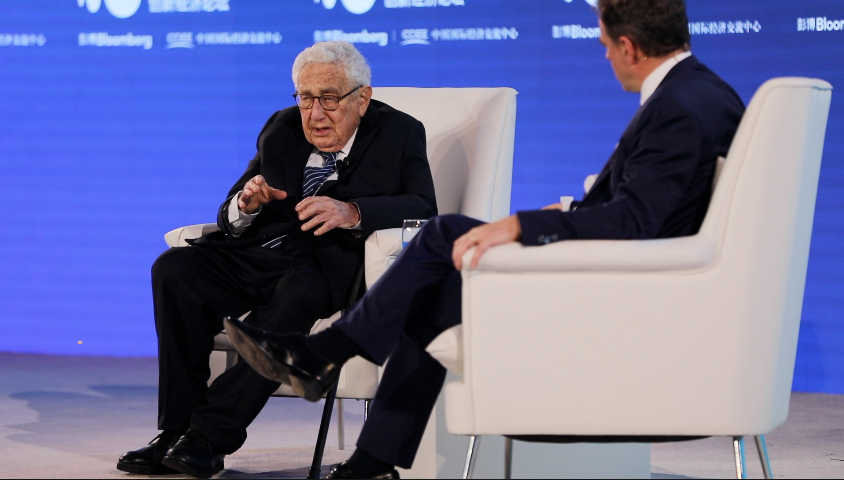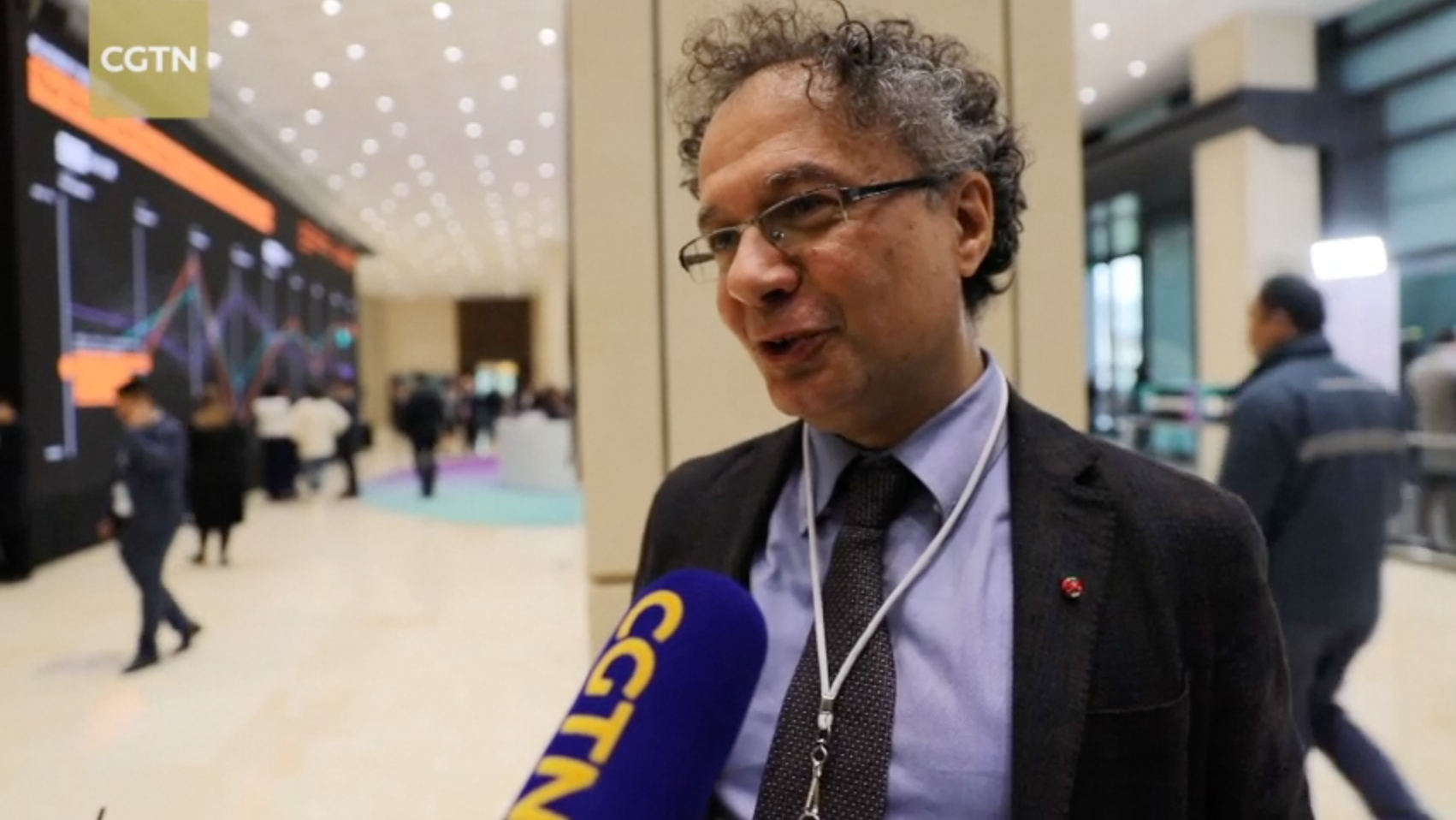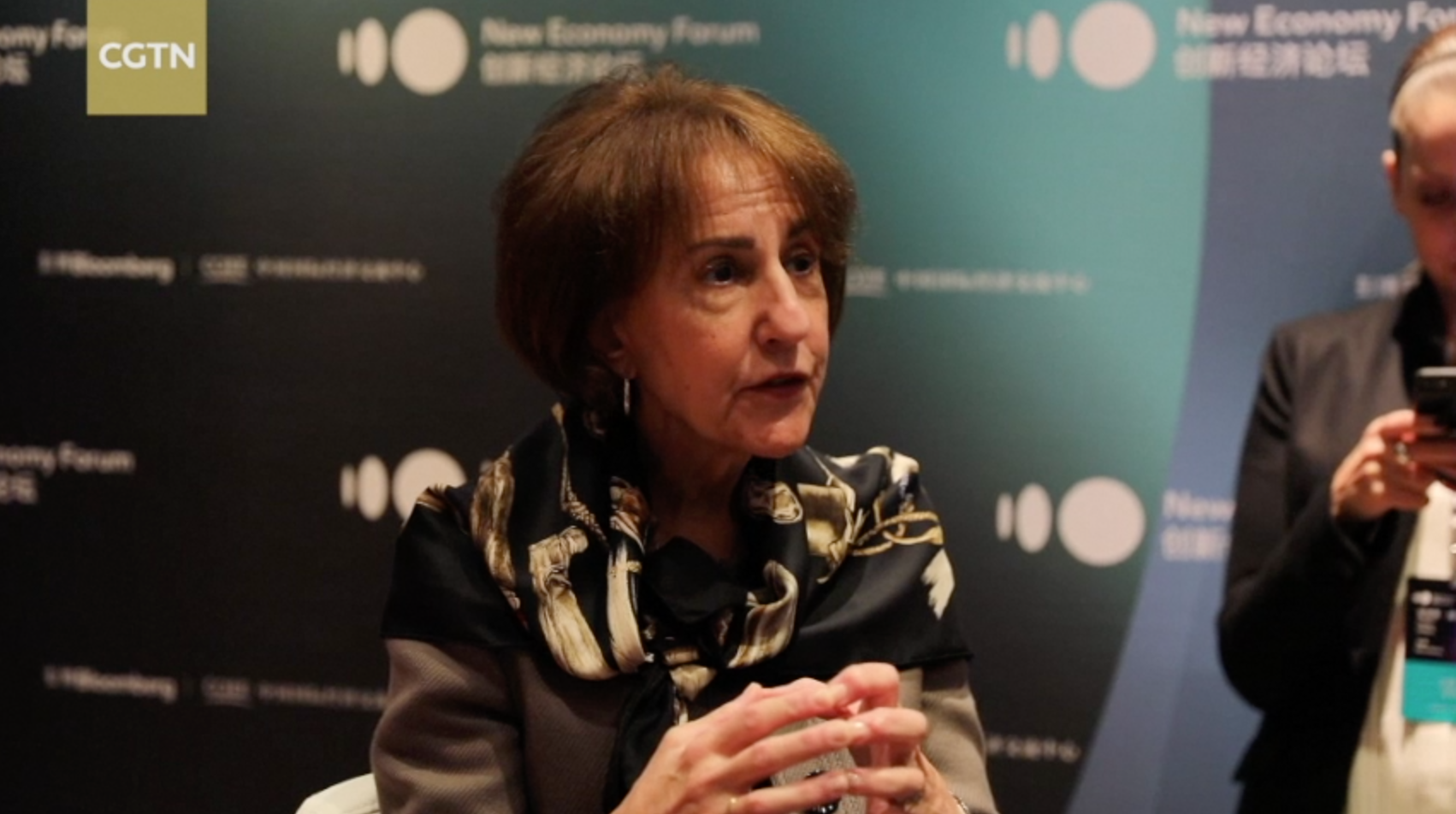03:30

The future of U.S.-China trade relations became the center of the New Economy Forum, hosted from November 20 to 22 in Beijing.
Henry Kissinger at 96 years old warned that the U.S. and China are at the foothill of a new cold war, and it's essential that the two countries don't go on the wrong trail.
Former U.S. Treasury Secretary Hank Paulson warned that the U.S. shouldn't make decoupling the China-U.S. economy a goal, and if the U.S. and China continue the trade war, the world might not be able to survive the next crisis.
During the forum, CGTN reporter talked with other guests, including former high-level policy makers from China, the U.S. and Europe, CEOs from international companies, and economists from think-tanks, to share their opinion on the future of U.S.- China trade relations.
Phase one deal possible within 2019
Bloomberg chief economist Tom Orlik believes that a phase one deal is definitely possible soon, since the previous stage didn't really touch many core conflicted areas between the two countries.
Moreover, Ian Bremmer, American political scientist and founder of Eurasia Group, added that from the U.S. domestic political point of view, Trump needs the deal for the re-election campaign.
"Trump is in a weaker position than he was five or six months ago, so he is in a 'let's make a deal mode,' not just with China by the way," Bremmer said.
"He has been very transparent with China in his greater urgency in a way he has backed out from the latest round of the tariff increasing, so China will look at the situation and know that Trump is incapable of continue to escalate the trade war," Bremmer predicted.
He also suggested that China should not wait too long to get a deal with Trump, because if Trump is re-elected, the trade war might escalate severely.
00:58

Michele Geraci, Italy's former Undersecretary of State for International Trade, and one of the promoters of the MOU of the Belt and Road Initiative (BRI) between China and Italy, is optimistic. "At the end of the day, an agreement between China and the U.S. will be found, because it is in the interests of the United States and China."
He also reminded that since 2020 is an election year in the U.S. there will be a lot of talk about the trade war. "I would expect the presidential candidate to be loud about trade protection since they need that kind of talk to attract voters, but maybe the Chinese consumers and policymakers shouldn't take that too seriously since they are really talking to their own electoral bases."
00:51

Though most forum participants are optimistic that we could see the phase one deal soon, Charlene Barshefsky, a senior international partner of Wilmerhale and former U.S. trade delegate, noted that the prospects are still unclear due to Trump's unsteady decision making.
"As to the prospects for a phase one deal, I would suggest you ask Donald Trump, and I did not say that to crack a joke," Barshefsky said.
"As we know, his decision-making is non-transparent and non-obvious," she said.
However, Barshefsky also said that it is safe to say that his eyes are on the 2020 election, so many of his decisions should be looked under that light.
Part tariffs could be removed for phase one deal
Barshefsky didn't think that removing all the tariffs imposed by the U.S. was realistic. However, she insisted, "China is absolutely right in demanding some tariffs be moved or lowered before agreeing to a phase one deal."
"Otherwise, it will be a one-sided deal, and I have never known China to sign a one-sided deal to their own disadvantage; no country does that," she asserted.
"My assumption is that some tariff relief would be provided to China in exchange for a phase one deal. It seems to me that's the only basis on which any deal could actually be done, certainly from the point of view of the Chinese side."
Speaking about other contents of the deal, Barshefsky said that Trump was interested in an "agricultural deal," but U.S. Trade Representative Robert Lighthizer was interested in structural changes in China.
"From Trump's point of view, agricultural purchases, with his eyes on farmers from the Midwest, which are swing states for his re-election, are critical," Barshefsky said.
Having worked with and known Lighthizer for many years, Barshefsky believes that Lighthizer and China's top negotiator Liu He are an even match, since they are both very skilled.
What happens if there is no deal?
"In a very negative scenario, where we get 30 percent tariffs on all U.S.-China trade, and we have continued elevated uncertainty, then we would see a drag on China's GDP of about 1.4 percent, and a drag on U.S. GDP of 1.1 percent," said Bloomberg chief economist Tom Orlik, whose team made calculations about the possible impacts of the trade war on the economy.

Bloomberg chief economist Tom Orlik. Photo: CGTN
Bloomberg chief economist Tom Orlik. Photo: CGTN
"There are no winners in trade war, if we don't have a trade deal, the two countries will both lose," said Orlik. The world economy is expanding at just 2.4 percent, so the pace of global growth has halved, and a big reason for that is the trade war, according to Orlik.
Assuming a positive scenario plays out, if the tariffs are rolled back to 25 percent on just 50 billion U.S. dollars, then the U.S. and China would both significantly benefit. "China GDP would benefit by 1.4 percent, and US GDP would benefit by 0.8 percent on an annual basis," said Orlik.
U.S.' national security excuse will hurt the country's credibility
On the issue of the Trump administration launching investigations into Chinese companies and impose sanctions, American cybersecurity fellow Samm Sacks said, "what's happening is that Trump administration has give green light to national security hawks to pursue any investigation against Chinese companies with additional sanctions imposed on Chinese companies on national security grounds."
Wei Jianguo, vice chairman of China Center for International Economic Exchanges and former vice minister for commerce stressed that Trump administration's focus on national security will hurt the U.S. economy in the long run, since the foreign investors will worry that they won't be able to have a transparent and level field to compete in, and foreign investors simply cannot trust the U.S. government anymore.
Cold politics and warm economy
At a political level, the U.S.-China relations have been turbulent, yet judging by the conversations at the New Economy Forum, and the ever expanding of foreign companies' list that joined the recently ended 2nd China International Import Expo (CIIE), the bilateral relationship can be described as "cold politics and warm economy."
"Over 190 American companies participated in the CIIE in Shanghai last month," said Wei Jianguo. The CIIE is aiming to promote international trade and communication. "The large number of U.S. companies even surprised the organizers."
"It shows that more U.S. companies are fed up with the government's security concern threat, they recognize China as the world's largest consumer market, and they want to grow with this market," Wei said.
Dannish Mikkel Hippe Brun is the co-founder of TradeShift, a company that has been operating in China for more than six years, connecting buyers and suppliers for more than 500 international companies.
"There are longstanding trade relations and partnerships between Chinese suppliers and the U.S. companies, that doesn't just change overnight because of a trade war," said Brun.
Brun gave an example of how a U.S. furniture company weathers through the trade war storm with its Chinese suppliers through cooperation.
"The U.S. furniture company and the Chinese suppliers are sharing the tariff, a lot of U.S. companies and their Chinese suppliers are doing that," Brun said.
"Trade insurance companies are also offering their support by lowering the insurance fees to zero to help the trade flow."
"So even amid the trade war, based on our observation, Chinese companies still remain competitive," Brun said.
"If you look at the people that are attending this conference, the conversation that has been had, and the openness of the discussion, we can believe that there are a lot of people in our society are willing to start creating trust between the U.S. and China, and try to make things better," Bremmer said.
"It is essential to start to create trust, that trust is not going to happen within a week or a month, but it is essential that it get started right now."
Reporter: Zhang Xinyuan
Videographer: Wang Tianyu
Video editor: Zhou Yiqiu, Wang Tianyu